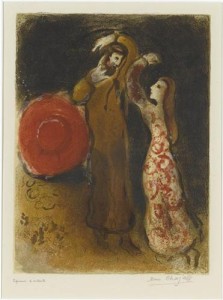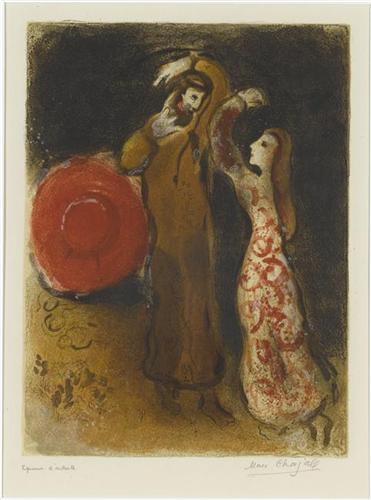
Central idea: What is marriage? Doctrine: Conjugal fidelity. Practical application: Witness conjugal fidelity in deed and word.
Written as an aid for homilists and a resource for the faithful, this doctrinal homily outline (1) provides insights into the Lectionary readings, (2) explicates a doctrine of Catholic Faith or morals from them, and (3) shows specific ways lay persons can live these truths. (To read more about this approach, click here.)
This outline is written to be in accord with the Homiletic Directory issued by the Congregation for Divine Worship and the Discipline of the Sacraments (2014). (To read an excellent summary of the Homiletic Directory, click here.)
To view Lectionary 140, click here.
Central idea: What is marriage?
Reading 1 Gn 2:18-24
The LORD God said: “It is not good for the man to be alone.
I will make a suitable partner for him.”
So the LORD God formed out of the ground
various wild animals and various birds of the air,
and he brought them to the man to see what he would call them;
whatever the man called each of them would be its name.
The man gave names to all the cattle,
all the birds of the air, and all wild animals;
but none proved to be the suitable partner for the man.So the LORD God cast a deep sleep on the man,
and while he was asleep,
he took out one of his ribs and closed up its place with flesh.
The LORD God then built up into a woman the rib
that he had taken from the man.
When he brought her to the man, the man said:
“This one, at last, is bone of my bones
and flesh of my flesh;
this one shall be called ‘woman,’
for out of ‘her man’ this one has been taken.”
That is why a man leaves his father and mother
and clings to his wife,
and the two of them become one flesh.
- As St. John Paul II points out, each human being exists in a kind of solitude, separate from the natural world and from other persons, including God, but he is created to be in relationship with all of them.
- Man has the capacity to understand nature but nature does not have the capacity to understand man. Adam could give names to the animals but they could not name him.
- We can imagine Adam having a great time playing with the animals and them with him, but he needed someone on his level. And this is why God made human beings male and female so that each could have a suitable partner or helper.
- As human persons, men and women are equal in dignity but complementary. Each has something the other needs physically, emotionally, and intellectually.
- Adam and Eve were created married. Husband-wife is the most fundamental and essential human relationship. It gives rise to that other fundamental and essential child-parent relationship.
Responsorial Psalm Ps 128:1-2, 3, 4-5, 6
R. May the Lord bless us all the days of our lives.
Blessed are you who fear the LORD,
who walk in his ways!
For you shall eat the fruit of your handiwork;
blessed shall you be, and favored.Your wife shall be like a fruitful vine
in the recesses of your home;
your children like olive plants
around your table.Behold, thus is the man blessed
who fears the LORD.
The LORD bless you from Zion:
may you see the prosperity of Jerusalem
all the days of your life.May you see your children’s children.
Peace be upon Israel!
- Fruitfulness is the primordial blessing of family life. From putting God first in their lives the husband’s work provides for his family, the wife is fruitful, and the children are full of promise.
Reading 2 Heb 2:9-11
Brothers and sisters:
He “for a little while” was made “lower than the angels, ”
that by the grace of God he might taste death for everyone.For it was fitting that he,
for whom and through whom all things exist,
in bringing many children to glory,
should make the leader to their salvation perfect through suffering.
He who consecrates and those who are being consecrated
all have one origin.
Therefore, he is not ashamed to call them “brothers.”
- Jesus Christ, who in his human nature was made perfect through his suffering, leads us to salvation.
- In his divine nature, he is infinitely greater than all the angels, but he took on human nature and so, for a little while, was less than an angel. He did this so he could die for us.
- Since all human beings come from the hand of God and Christ, as man, had a true human nature, we and he have a common origin as children of God. He is our brother. Christ offered himself for God’s children. He makes us holy and we are being made holy by our free actions in cooperation with his grace.
- This is so true today in the arena of the virtue of chastity and of marriage and the family.
Alleluia 1 Jn 4:12
If we love one another, God remains in us
and his love is brought to perfection in us.
- What could be better than for God to be with us always and for his love to be brought to perfection in us?
- This will be the case if we love one another.
- This makes us ask once again, What is love and how do we practice it?
- Love is willing the true good of the other, even if it requires sacrifice. This is why we find ourselves by making ourselves a sincere gift of self.
- For all of us, this should begin with experiencing it within our families.
- For most of us, we learn to practice it in a special way as husbands or wives and then as fathers or mothers.
Gospel Mk 10:2-16
The Pharisees approached Jesus and asked,
“Is it lawful for a husband to divorce his wife?”
They were testing him.
He said to them in reply, “What did Moses command you?”
They replied,
“Moses permitted a husband to write a bill of divorce
and dismiss her.”
But Jesus told them,
“Because of the hardness of your hearts
he wrote you this commandment.
But from the beginning of creation, God made them male and female.
For this reason a man shall leave his father and mother
and be joined to his wife,
and the two shall become one flesh.
So they are no longer two but one flesh.
Therefore what God has joined together,
no human being must separate.”
In the house the disciples again questioned Jesus about this.
He said to them,
“Whoever divorces his wife and marries another
commits adultery against her;
and if she divorces her husband and marries another,
she commits adultery.”And people were bringing children to him that he might touch them,
but the disciples rebuked them.
When Jesus saw this he became indignant and said to them,
“Let the children come to me;
do not prevent them, for the kingdom of God belongs to
such as these.
Amen, I say to you,
whoever does not accept the kingdom of God like a child
will not enter it.”
Then he embraced them and blessed them,
placing his hands on them.
- In this question of whether marriage is indissoluble, whether a married couple can separate and their separation ends their marriage, Jesus goes to the very heart of marriage, rooted in God’s original plan.
- We can call this the primordial reality of marriage. This origin of marriage can shed light on all aspects of marriage as well as answer the questions the Pharisees asked Jesus.
- God created human beings as male or female, equal and complementary. He created our first parents in the married state and for each other in a one-flesh union. This one-flesh union made by God is how new human beings come into the world within a family. And one day this child (in the normal course of things) will leave his father and mother and marry, and he and his female spouse will become one flesh, too. This union is permanent and exclusive, that is, life-long (and so, unbreakable) and between those two only.
- And in God’s plan, the family is the normal way that children will be brought to be in a right relationship with God. A child can easily accept the kingdom of God in a family in which father and mother live this one-flesh union of love.
Doctrine: Conjugal fidelity
- We have witnessed in the last century a slowly building and now crashing tidal wave of forces aimed at the destruction of marriage and the family. First contraception in the 1930s, then the sexual revolution of the 1960s and “shacking up,” then radical feminism, homosexual “rights,” and no-fault divorce, then reproductive technologies that made possible procreation without sex, then internet pornography and “hooking up,” now homosexuality marriage, and finally, most recently, the “truth” that gender (of which there are, it is claimed, many more than two) is something people assign themselves.
- Against this are the truths about man and woman inscribed in reality and supported and elevated by the Sacrament of Matrimony. We are created male or female. Men and women are equal but complementary. Marriage can only be between a man and a woman. Marriage by its nature is exclusive and permanent and open to children. The marital embrace has two purposes: unitive and procreative. Contraception is immoral. The supreme good of marriage is children. Children require fathers and mothers to sacrifice themselves. And marriage and the family are a kind of arena in which husbands and wives grow in holiness through their sincere gift of self to one another and their children.
Practical application: Witness conjugal fidelity in deed and word
- All Catholics must be living witnesses of the virtue of chastity. Married Catholics must be witnesses of conjugal fidelity—that their love be mutual, exclusive, and permanent. This places on us difficult moral demands. Our culture rejects this “burden” but we happily embrace it, because conjugal fidelity corresponds to the truth about the reality of marriage and we have God’s grace to live it out.
- In deed. Our effort to live the truth about marriage and the family will move many to imitate us and some to hate and persecute us.
- In word. We also need to be witnesses to the truth about marriage our words and public actions. This will also invite imitation by some. It will also result in persecution from those who hold the neo-pagan view of human sexuality and who currently wield power in government, the corporate world, academia, and the mass media.
- We will be okay though. Genesis is still true. Psalm 28 is still true. The Gospel is still true.

Leave a Reply